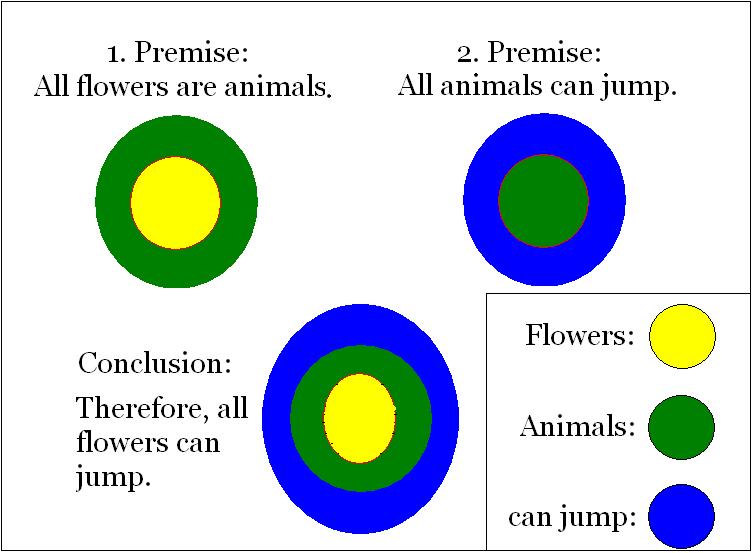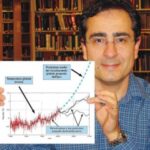Onlangs poste Rypke een artikel met een leuke foto van een mees op zijn laptop (ja het was Windows). Dat plaatje had ik ook boven dit artikel kunnen zetten want ik vond een hele treffende tekst in een reactie op Notrickzone.com die uitlegt waarom Otto et al. (aarde warmt veel minder snel op dan eerder gedacht van klimaatgevoeligheid is lager) een klassieke post hoc fallacy is. Kijk ik op Wikipedia zie ik dat het eigenlijk om een cum hoc ergo propter hoc drogreden gaat.
Mindert Eiting
21. Mai 2013 at 14:21 | Permalink | ReplyThe sensitivity parameter is a statistical play in a small window of temperatures and CO2 levels and the assumption that the latter causes the first. We could also take world food production and we would get a food sensitivity parameter. With rising CO2 level and stagnating temperatures we will observe in one publication after the other that the estimate slowly declines, but this does not add anything to what we already know. If there is a reason to abandon the ship, it simply can be found in the past fifteen years of temperature data.
But the most absurd is the IPCC-confidence distribution for the parameter. It is impossible to obtain that in a honest way because we do not know how selective the window is chosen. This is not a random choice from world history but the result of an obsession and the inevitable post-hoc fallacy.
Just focus your attention on something unusual, for example a bird flew through your window and is now sitting in your room. If you are a statistician, you may try the null hypothesis that windows are left randomly open and that birds fly randomly around. You will find that the probability of the event on precisely this day is extremely low. This is ‘significant’ and you have to conclude that there is something in your house attracting birds. After some theorizing you may decide to compute a bird sensitivity parameter for your home. The value will be shocking high. You could also make a distribution for the real value and find the trivial result that the probability of a low sensitivity must be extremely low. Of course, you have to recompute the estimate from day to day. Because the birds do not return, the estimate declines but will remain disturbing high because you do not drop the event on the basis of which you began the exercise. The post-hoc fallacy is an important factor behind the decline effect, of which we see here a nice example.
Volgens mij is het voorbeeld van het vogeltje dat hij noemt geen post hoc is maar een een cum hoc ergo propter hoc maar dat maakt zijn woorden niet minder treffend. Doet me denken aan de recente vondst van Steven Goddard van de Amerikaanse geoloog die zei dat het niet waar kon zijn dat Wegeners theorie van de schuivende continenten waar zou zijn want dan zou alles wat de laatste 70 jaar was opgebouwd aan theorieën overboord moeten en alles opnieuw moeten worden gedaan. Inderdaad. Wetenschap is sisyfusarbeid. Behalve als je activistische wetenschapper bent natuurlijk. Dan wil je côute que côute naar jouw heilstaat. Die geoloog had destijds moeten zeggen: “een nieuwe studie leert ons dat de stilstand van de continenten half zo groot is als eerder gedacht!”
Laten we kijken wat die Eiting nog meer te melden heeft:
Even verder in de comments zegt hij:
The distribution could be of a type in which mean and variance are correlated. With a lower mean we could get an increased variance. I do not give a penny for a distribution based on the post-hoc fallacy. They should do the computations on data not yet used in the process upto this point. I’ve posted a short comment that did not arrive here. Let it be: the essence is that we see the well known decline effect to be expected after the post-hoc fallacy.
Hier in een reactie op deze post op Notrickzone zien we dat Eiting zijn drogreden natuurlijk heeft geleend van Lord Monckton. Hoe kon het ook anders:
Monckton wrote: “The greatest error in the Berkeley team’s conclusion is in Dr. Müller’s assertion that the cause of all the warming since 1750 is Man. His stated reason for this conclusion is this: “Our result is based simply on the close agreement between the shape of the observed temperature rise and the known greenhouse gas increase.” No Classically trained scientist could ever have uttered such a lamentable sentence in good conscience. For Dr. Müller here perpetrates a spectacular instance of the ancient logical fallacy known as the argument from false cause – post hoc, ergo propter hoc”.
Dit is inderdaad een zuivere post hoc. Op WUWT in deze post discussieert Eiting met ene Matt Skaggs over de post hoc fallacy en schrijft hij:
To me this example shows that there is something seriously wrong with post hoc assigning probabilities to single events. Suppose, you walk on the street and meets a friend you haven’t seen for ten years. Depending on all arbitrary elements you use in your calculation the probability of this event may be as low as one in a trillion. Your whole day is filled with these extra ordinary cherry-picked events. If you use an infinite amount of aspects for the event, each associated with a number between 0 and 1, the end result will be zero anyhow. That is also the probability of your own existence.
Grappige overwegingen allemaal. Post hoc of niet het is gewoon allemaal geen wetenschap omdat wetenschap weer opnieuw bij nul hoort te beginnen als een ingeslagen weg doodlopend blijkt te zijn. Mijn eye opener is gewoon wat Richard Feynman erover zegt: je moet de bommetjes onder je eigen theorie al inbouwen in je publicatie. Wie dat niet doet produceert sowieso al geen wetenschap! In plaats van het eeuwige: “Maar de eindconclusies staan nog overeind” of “Maar dat wil niet zeggen dat de aarde niet catastrofaal opwarmt”, zou een ware wetenschapper juist zelfs onder het meest overtuigende alarmistische artikel – met of zonder hockey stick – moeten zetten: “De hypothese lijkt bewezen, maar als dit of dat dan moeten we weer van voren af aan beginnen”. Journalisten van Nederland opgelet: als dat niet in het persbericht staat kun je de hele studie terzijde leggen.
Of luister zelf naar Feynman die wel wist wat wetenschap was.
Enne o ja, wat mij betreft is heel climatedialogue.org post hoc! Spijt me. Sorry. Wel elke dag Notrickszone.com lezen! Retespannend!
PS Hier nog de bron van het plaatje bovenaan. Spijker je klassieken even bij.
PPS Wat is NIET post hoc? Niet post hoc is om ons allemaal kapot te schrikken van hoe erg het is misgelopen in de klimaatwetenschap en een algeheel moratorium van 4 jaar op alle alarmistische statements op straffe van verwijdering van de universiteit. ANBI afpakken van Greenpeace en WWF en nog zo wat. Over vier jaar als politiek nog eens kijken naar wat jonge onbesmette wetenschappers dan zeggen over klimaat. Dat is niet post hoc!







@Hajo: Het is slechts een klassieker uit de wijsbegeerte (= petitio principii): “Man past in regenjas. Regenjas past in aktetas. Man past in aktetas.”
In de gepolitiseerde sociale-psychologie worden dit soort constructies in variatie daarop met verdachte correlaties voor politieke doeleinden toegepast. “Vlees eten door de mens is slecht voor het klimaat. Vele mensen zijn hufter. Vleeseters zijn hufters”.
Als je oplet wat de sociale-psychologie regelmatig als onderzoeksresultaten naar buiten brengt over sceptici/deniers van de wereldwijde klimaat-milieu-energie-crises hoax, dan vind je dergelijke “wetenschappelijke” resultaten met bedachte correlaties.
Dit is er dus ook een: http://www.trouw.nl/tr/nl/4492/Nederland/article/detail/3444924/2013/05/22/Vooral-PVV–en-SP-stemmers-geloven-in-complotten.dhtml
Geweldige blog, Hajo. Notrickzone …ja het is inderdaad leuk/interessant om te lezen wat er in Klimaschutz(Deutsch)land met de hype gebeurt ;-).
Zo ook de recentste blog van Pierre Goselin over de Duitse ZDF berichtgeving over de tornado, die in Oklahoma zoveel schade aanrichtte.
Ik keek toevallig, die dag naar de uitzending van de ARD (en niet veel beter), en daar werd natuurlijk ook de opwarming er bij gehaald. Geen enkele heldere metereologische uitleg, maar wel die alarmistische prietpraat van “een wetenschapsjournalist”, die wist te melden dat het er wel veel meer zouden worden t.g.v. de opwarming.
Dan was die weerman op het NOS-journaal, dat ik zag via BVN veel beter, want hij legde dus wel de werking uit en waarom het gebied “Tornado alley” wordt genoemd. Dat moet deze weerman ook wel, want zijn bericht wordt ook door Nederlanders in de States bekeken.
Duik je daar wat dieper in dat tornado fenomeen en aantallen, dan komt er ook noch de vraag bij hoe nauwgezet werd er vroeger en nu een tornado gemeld.
Informatief neutraal is ook dit stukje in de Volkskrant.
Geweldige blog, Hajo. Notrickzone …ja het is inderdaad leuk/interessant om te lezen wat er in Klimaschutz(Deutsch)land met de hype gebeurt ;-).
Zo ook de recentste blog van Pierre Goselin over de Duitse ZDF berichtgeving over de tornado, die in Oklahoma zoveel schade aanrichtte.
Ik keek toevallig, die dag naar de uitzending van de ARD (en niet veel beter), en daar werd natuurlijk ook de opwarming er bij gehaald. Geen enkele heldere metereologische uitleg, maar wel die alarmistische prietpraat van “een wetenschapsjournalist”, die wist te melden dat het er wel veel meer zouden worden t.g.v. de opwarming.
Dan was die weerman op het NOS-journaal, dat ik zag via BVN veel beter, want hij legde dus wel de werking uit en waarom het gebied “Tornado alley” wordt genoemd. Dat moet deze weerman ook wel, want zijn bericht wordt ook door Nederlanders in de States bekeken.
Duik je daar wat dieper in dat tornado fenomeen en aantallen, dan komt er ook noch de vraag bij hoe nauwgezet werd er vroeger en nu een tornado gemeld.
Informatief neutraal is ook dit stukje in de Volkskrant.
mees op labtop.
idee?
Tegen het symbool van de zielige beer op de ijsschots kan je niet argumenten.Maar we kunnen wel ernaast als logo van de sceptici een plaatje doen van de TITANIC (1912)
met daaronder de tekst:
ijschotsen zijn van alle tijden….
Henri de Melay.
Inderdaad elke windmolen en zonnepaneel is een “Cargo-cult” symbool, dat de verwachting op gratis energie uitstraalt, maar meer ook niet. Dat geeft ook de sfeer weer van de groene beweging, die teert op de behoefte aan religie van de domme massa. Na de ontkerkelijking heeft de groene beweging die moraal van de kerk geabsorbeerd in een nieuw uitgevonden pseudo religie, die net als vroeger wetenschappelijke waarheden pretendeerde te verkondigen, maar slechts een hap snap persiflage was van wat uitzonderingsgevallen en een hoog gehalte aan anekdotische bewijsvoering. Het heeft zijn eigen schare aan hoge priesters , zoekt bescherming en de hefboom voor verbreiding en machtsuitoefening van de overheid en is net als elk ander geloof uit op het vernietigen van elk ander geloof. Hier iets over zo’n hoge priester vastgezogen in de academische wereld en gebruikmakend van de status van het ambt als professor.
http://www.dagelijksestandaard.nl/2013/05/delftse-hoogleraar-gerard-van-bussel-verspreidt-desinformatie-over-windenergie#comment-312842
@Henri de la Haye: De nieuwe kleine ijstijd ligt voor ons de komende 30 jaar volgens de astronomen. Begin 2011 begon de nieuwe 11 jarige zonnecyclus, die bijzonder zwak zal zijn.
Deze zonnecyclus zal een sterk verminderde activiteit laten zien met weinig of geen zonnevlekken volgens emeritus hoogleraar Cornelis de Jager . De nieuwe “kleine ijstijd” zal veel lijken op de Kleine IJstijd in de 17de en 18de eeuw.
Het was toen “iets” kouder dan heden. In de winter van 1794-1795 veroverde het Frans invasieleger de marine vloot van de Republiek der Verenigde Nederlanden, voor anker liggend en vervolgens ingevroren in het zee-pakijs op de rede voor Texel/Den Helder.
Dit schilderij beeld de inbeslagname van de marine vloot uit in de winter 1794-1795 vastgevroren liggend voor Texel.
http://www.eugeneleliepvre.com/images/11_Eugene_Leliepvre_Flotte_hollandaise_prise_par_les_Francais_au_Texel_1795_BD.jpg
op
http://wattsupwiththat.com/2013/05/23/newsbytes-eu-leaders-back-shale-revolution-roll-back-climate-policy/
Ik ben benieuwd of mevrouw van Veldhoven en de heer Rutte in dit geval ook naar ‘Brussel’ luisteren.
Ze zullen wel moeten:
Dit nieuws behoeft ook alle aandacht van de kroonleden van de SER en de afgevaardigden van VNO/NCW die onder druk van de milieubeweging een zogenaamd duurzaam akkoord proberen te bereiken dat de Nederlandse burgers weer schatten met geld gaat kosten. Op naar 15 procent werkloosheid en nog meer bedrijfssluitingen.
Dames, en heren ook van de SER en VNO/NCW, laat u niets wijs maken door de milieubeweging. Het is een wanhoopsoffensief van niets ontziende lieden in de wetenschap dat Brussel de lijntjes op klimaat- en energie gebied laat vieren. Brussel leert ons dat alle verhalen van milieubewegingen niets anders zijn dan hersenspinsels gelardeerd met leugens met de bedoeling de bevolking bang te maken.
De honderden miljarden besparing die deze draai van Brussel oplevert komen ten goede aan de economieën en verdwijnt niet meer in de zakken van de groene leugenaars.
Bovenstaande betekent niets meer en minder dan het faillissement van de Nederlandse windindustrie, die, o schande, een steeds gewilliger oor krijgt van het meer en meer naar links opschuivend Financieel Dagblad, dat tegenwoordig pagina’s vol kostbare ruimte leent aan figuren als Hiddes van de NWEA en andere zakenlieden die grote belangen hebben in de zogenaamde duurzame sector en op kosten van de FD abonnee hun duurzame klimaat hysterie mogen promoten.
Het 16e jaar kouder dan de hockeystick referentie?
Lange termijn weersvoorspelling : wat klopt ervan?
http://www.knack.be/nieuws/buitenland/we-krijgen-de-koudste-zomer-in-200-jaar/article-4000314433045.htm